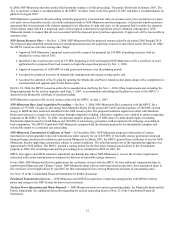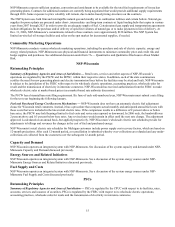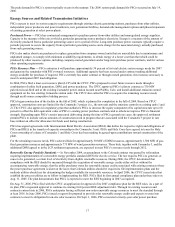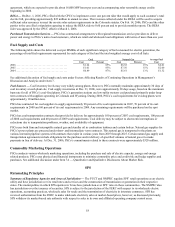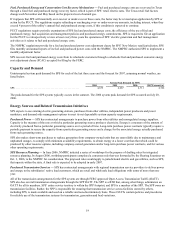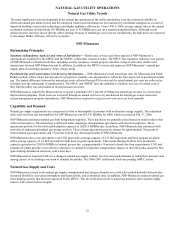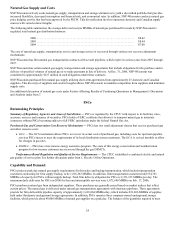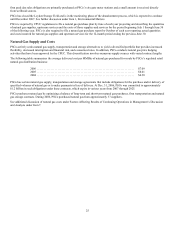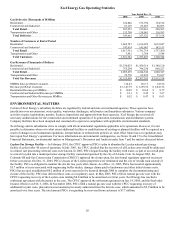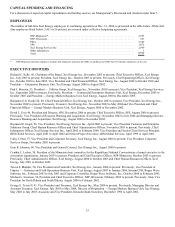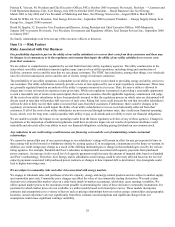Xcel Energy 2006 Annual Report Download - page 28
Download and view the complete annual report
Please find page 28 of the 2006 Xcel Energy annual report below. You can navigate through the pages in the report by either clicking on the pages listed below, or by using the keyword search tool below to find specific information within the annual report.
18
agreement, which are expected to provide about 16,000 MW hours per year and accompanying solar renewable energy credits
beginning in 2008.
RESA — On Dec. 1, 2005, PSCo filed with the CPUC to implement a new one percent rider that would apply to each customer’s total
electric bill, providing approximately $22 million in annual revenue. The revenues collected under the RESA will be used to acquire
sufficient solar resources to meet the on-site solar system requirements in the Colorado statutes. On Feb. 14, 2006, PSCo and the other
parties to the case filed a stipulation agreeing to reduce the RESA rider to 0.60 percent and to provide monthly reports. The RESA
rider was approved by the CPUC effective March 1, 2006.
Purchased Transmission Services — PSCo has contractual arrangements with regional transmission service providers to deliver
power and energy to PSCo’s native load customers, which are retail and wholesale load obligations with terms of more than one year.
Fuel Supply and Costs
The following table shows the delivered cost per MMBtu of each significant category of fuel consumed for electric generation, the
percentage of total fuel requirements represented by each category of fuel and the total weighted average cost of all fuels.
Coal Natural Gas Average Fuel
Cost Percent Cost Percent Cost
2006........................................ $ 1.24 85% $ 6.52 15% $ 2.01
2005........................................ $ 1.01 85% $ 7.56 15% $ 2.00
2004........................................ $ 0.89 87% $ 5.61 13% $ 1.52
See additional discussion of fuel supply and costs under Factors Affecting Results of Continuing Operations in Management’s
Discussion and Analysis under Item 7.
Fuel Sources — Coal inventory levels may vary widely among plants. However, PSCo normally maintains approximately 30 days of
coal inventory at each plant site. Coal supply inventories at Dec. 31, 2006, were approximately 30 days usage, based on the maximum
burn rate for all of PSCo’s coal-fired plants. PSCo’s generation stations use low-sulfur western coal purchased primarily under long-
term contracts with suppliers operating in Colorado and Wyoming. During 2006, PSCo’s coal requirements for existing plants were
approximately 10 million tons.
PSCo has contracted for coal suppliers to supply approximately 98 percent of its coal requirements in 2007, 70 percent of its coal
requirements in 2008 and 60 percent of its coal requirements in 2009. Any remaining requirements will be purchased on the spot
market.
PSCo has coal transportation contracts that provide for delivery for approximately 100 percent of 2007 coal requirements, 100 percent
of 2008 coal requirements and 40 percent of 2009 coal requirements. Coal delivery may be subject to short-term interruptions or
reductions due to transportation problems, weather, and availability of equipment.
PSCo uses both firm and interruptible natural gas and standby oil in combustion turbines and certain boilers. Natural gas supplies for
PSCo’s power plants are procured under short- and intermediate- term contracts. This natural gas is transported to the plants on
various interstate pipeline systems with contracts that expire in various years from 2007 through 2025. Certain natural gas supply and
transportation agreements include obligations for the purchase and/or delivery of specified volumes of natural gas or to make
payments in lieu of delivery. At Dec. 31, 2006, PSCo’s commitments related to these contracts were approximately $328 million.
Commodity Marketing Operations
PSCo conducts various wholesale marketing operations, including the purchase and sale of electric capacity, energy and energy
related products. PSCo uses physical and financial instruments to minimize commodity price and credit risk and hedge supplies and
purchases. See additional discussion under Item 7A — Quantitative and Qualitative Disclosures About Market Risk.
SPS
Ratemaking Principles
Summary of Regulatory Agencies and Areas of Jurisdiction — The PUCT and NMPRC regulate SPS’ retail operations as an electric
utility and have jurisdiction over its retail rates and services and the construction of transmission or generation in their respective
states. The municipalities in which SPS operates in Texas have jurisdiction over SPS’ rates in those communities. The NMPRC also
has jurisdiction over the issuance of securities. SPS is subject to the jurisdiction of the FERC with respect to its wholesale electric
operations, accounting practices, wholesale sales for resale and the transmission of electricity in interstate commerce. SPS has
received authorization from the FERC to make wholesale electricity sales at market-based prices, however, as discussed previously,
SPS withdrew its market-based rate authority with respect to sales in its own and affiliated operating company control areas.






